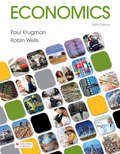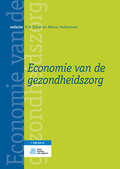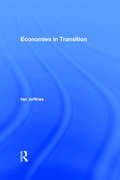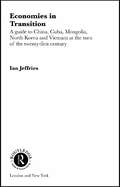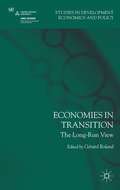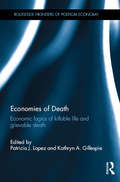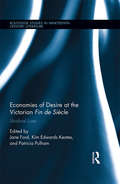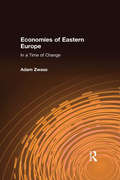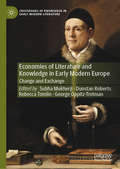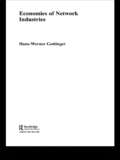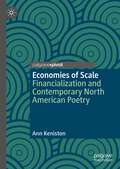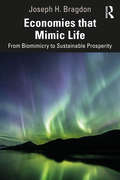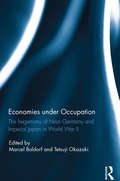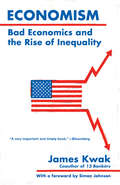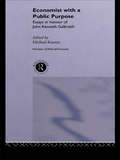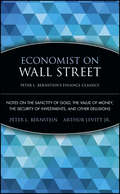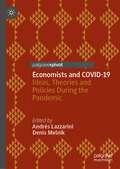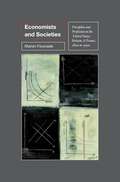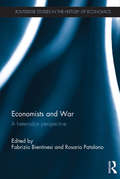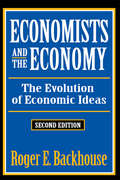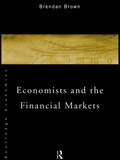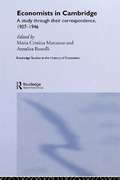- Table View
- List View
Economics: Theory And Policy (Addison-wesley Series In Economics)
by Paul Krugman Robin WellsWith its signature storytelling style and coverage of current issues and events, Nobel laureate and New York Times columnist Paul Krugman and co-author, Robin Wells’s best-seller is the most effective textbook available for explaining how economic concepts play out in our world. This new edition offers incisive new insight into market power and externalities in microeconomics, updated analysis of long-run growth, and extensive coverage of the economic impacts and policy responses to the coronavirus pandemic in macroeconomics.
Economics: Theory Through Applications
by Russell Cooper A. Andrew JohnThis textbook, Economics: Theory Through Applications, centers around student needs and expectations through two premises: ... Students are motivated to study economics if they see that it relates to their own lives. ... Students learn best from an inductive approach, in which they are first confronted with a problem, and then led through the process of solving that problem. Many books claim to present economics in a way that is digestible for students; Russell and Andrew have truly created one from scratch. This textbook will assist you in increasing students' economic literacy both by developing their aptitude for economic thinking and by presenting key insights about economics that every educated individual should know.
Economics: Work & Prosperity in Christian Perspective (3rd Edition)
by Russell KirkThis edition brings Economics: Work & Prosperity up to date and enhances the study with review questions and other features designed to reinforce learning.
Economics: Work and Prosperity in the Christian Perspective (Second Edition)
by Russell Kirk Julie LostrohOffers a view of economics from the standpoint of Biblical authority.
Economie van de gezondheidszorg
by Erik Schut Marco VarkevisserDeze zesde - ongewijzigde - druk van dit leerboek geeft een overzicht van de "state-of-the-art" gezondheidseconomische kennis en inzichten. Wereldwijd legt de gezondheidszorg een steeds groter beslag op de beschikbare financiele middelen. Die middelen worden steeds schaarser. Als gevolg van de toenemende vergrijzing en de immer voortschrijdende medisch-technische behandelmogelijkheden komt hierin de komende decennia geen verandering. Integendeel, de vraag of de beschikbare middelen doelmatig worden besteed speelt een steeds belangrijkere rol. Het is niet verwonderlijk dat ook het vakgebied economie van de gezondheidszorg nog altijd volop in ontwikkeling is. De groeiende stroom theoretische en empirische bevindingen die hiervan het gevolg is, vormde de aanleiding voor een grondige herziening van het leerboek "Economie van de gezondheidszorg "in 2014 (de vijfde druk). De auteurs hebben in 2014 de bestaande hoofdstukken grondig herzien en geactualiseerd, en bovendien zijn enkele hoofdstukken toegevoegd over belangrijke thema's zoals de rol van leefstijl en preventie en de honorering van zorgaanbieders. In deze editie is er opnieuw veel aandacht voor actuele beleidsthema's in de Nederlandse gezondheidszorg, zoals het functioneren van het stelsel van gereguleerde concurrentie, dat vooral sinds de invoering van de basisverzekering in 2006 steeds meer gestalte heeft gekregen. Tot de vele onderwerpen die aan bod komen behoren onder andere: de bijdrage van investeringen in gezondheidszorg aan de volksgezondheid;de dreigende onbetaalbaarheid van gezondheidszorg;het effect van zorgverzekeringen en eigen betalingen op het gedrag van zorgvragers;het effect van een ongezonde leefstijl en preventie op de zorguitgaven;de positieve en negatieve gevolgen van uitkomstbekostiging;de aan- of afwezigheid van schaalvoordelen bij zorginstellingen;de economische evaluatie van nieuwe medische technologieen;de randvoorwaarden voor gereguleerde concurrentie in de zorg;het belang van effectief mededingingstoezicht in de zorg. Het leerboek "Economie van de gezondheidszorg" is samengesteld onder redactie van Erik Schut en Marco Varkevisser, beiden werkzaam bij het instituut Beleid & Management Gezondheidszorg (iBMC) van de Erasmus Universiteit Rotterdam. Tal van gerenommeerde (gezondheids)economen hebben een bijdrage geleverd. Het leerboek is primair bedoeld voor studenten van universiteiten en hoger beroepsonderwijs, en vormt bij diverse opleidingen al jaren een vast onderdeel van het curriculum. Daarnaast is het geschikt voor deelnemers aan post-hoger onderwijs en managementopleidingen in de gezondheidszorg. Mede door de verscheidenheid aan beleidsrelevante onderwerpen is het leerboek eveneens nuttig voor beleidsmakers, bestuurders, managers, adviseurs en toezichthouders die de belangrijke economische vraagstukken in de zorg beter willen doorgronden. Maak ook gebruik van de toevoegingen in de online leeromgeving StudieCloud. Hierop staan deeplinks, samenvattingen en extra oefenvragen naast het boek. "
Economies in Transition
by Ian JeffriesThis volume provides an in-depth review of major economic developments in those economies which are in some stage of transition, following the collapse of communism in the Eastern block. The book is divided into four parts: * theoretical issues in the transition from command to market economies * the events in the fifteeen independent countries of the former Soviet Union * Eastern Europe * non-European states In all, the author chronicles events from 1993 to 1995 in thirty-five countries. Economic developments are set in their political context and presented chronologically as far as possible. A Guide to the Economies in Transition carries on where Ian Jeffries' previous book left off. The work is entirely new and, as such, can be seen as a companion to the earlier title. These books are becoming known as invaluable guides, providing unique levels of reference in work of this type.
Economies in Transition: A Guide to China, Cuba, Mongolia, North Korea and Vietnam at the turn of the 21st Century (Routledge Studies in Development Economics #Vol. 22)
by Ian JeffriesFirst Published in 2004. Routledge is an imprint of Taylor & Francis, an informa company.
Economies in Transition: The Long-Run View (Studies in Development Economics and Policy)
by Gérard RolandThe twentieth anniversary of the fall of the Berlin Wall saw many reflect on the political, economic and social changes of recent years. The legacy of communism and the economic prospects of post-communist countries are rigorously analysed in this stimulating study of the long term consequences of transition.
Economies of Death: Economic logics of killable life and grievable death (Routledge Frontiers of Political Economy)
by Patricia J. Lopez Kathryn A. GillespieEconomies of Death: Economic Logics of Killable Life and Grievable Death examines the economic logic involved in determining whose lives and deaths come to matter and why. Drawing from eight distinct case studies focused on the killability and grievability of certain humans, animals, and environmental systems, this book advances an intersectional theory of economies of death. A key feature of late-modern capitalism is its tendency to economically order certain human and nonhuman lives and environments, while appropriating and commodifying certain bodies and spaces in the process. Spanning the social sciences and humanities in its contributions and scope, each chapter shows how living beings and places are stripped down to the calculus of their end, with profound ethical and political implications for these entities and the world around them. From the genocide in Cambodia to the way some animals are considered ‘pets’ and others ‘food’; from September 11, 2001 and Afghanistan to the politics of redemption for prisoners and ex-racehorses in Kentucky, these case studies draw from and develop an enriched understanding of bio- and necropolitics, posthumanism, killability and grievability. In drawing together the objectification of humans, animals and environments (and the power-laden hierarchies that maintain this objectification), this volume highlights how death across these subjects informs and responds to broader geo-economic processes. This book aims to examine the reach of economies of death across such diverse subjects, challenging readers to consider the every-day calculus they make in determining whose lives mean more and why.
Economies of Desire at the Victorian Fin de Siècle: Libidinal Lives (Routledge Studies in Nineteenth Century Literature)
by Patricia Pulham Jane Ford Kim Edwards KeatesThis volume marks the first sustained study to interrogate how and why issues of sexuality, desire, and economic processes intersect in the literature and culture of the Victorian fin de siècle. At the end of the nineteenth-century, the move towards new models of economic thought marked the transition from a marketplace centred around the fulfilment of ‘needs’ to one ministering to anything that might, potentially, be desired. This collection considers how the literature of the period meditates on the interaction between economy and desire, doing so with particular reference to the themes of fetishism, homoeroticism, the literary marketplace, social hierarchy, and consumer culture. Drawing on theoretical and conceptual approaches including queer theory, feminist theory, and gift theory, contributors offer original analyses of work by canonical and lesser-known writers, including Oscar Wilde, A.E. Housman, Baron Corvo, Vernon Lee, Michael Field, and Lucas Malet. The collection builds on recent critical developments in fin-de-siècle literature (including major interventions in the areas of Decadence, sexuality, and gender studies) and asks, for instance, how did late nineteenth-century writing schematise the libidinal and somatic dimensions of economic exchange? How might we define the relationship between eroticism and the formal economies of literary production/performance? And what relation exists between advertising/consumer culture and (dissident) sexuality in fin-de-siecle literary discourses? This book marks an important contribution to 19th-Century and Victorian literary studies, and enhances the field of fin-de-siècle studies more generally.
Economies of Eastern Europe in a Time of Change: In A Time Of Change
by Adam ZwassThe development and use of the atomic bombs at Hiroshima and Nagasaki number among the formative national experiences for both Japanese and Americans as well as for 20th-century Japan-US relations. This volume explores the way in which the bomb has shaped the self-image of both peoples.
Economies of Literature and Knowledge in Early Modern Europe: Change and Exchange (Crossroads of Knowledge in Early Modern Literature #2)
by Subha Mukherji Dunstan Roberts Rebecca Tomlin George Oppitz-TrotmanPlacing ‘literature’ at the centre of Renaissance economic knowledge, this book offers a distinct intervention in the history of early modern epistemology. It is premised on the belief that early modern practices of change and exchange produced a range of epistemic shifts and crises, which, nonetheless, lacked a systematic vocabulary. These essays collectively tap into the imaginative kernel at the core of economic experience, to grasp and give expression to some of its more elusive experiential dimensions. The essays gathered here probe the early modern interface between imaginative and mercantile knowledge, between technologies of change in the field of commerce and transactions in the sphere of cultural production, and between forms of transaction and representation. In the process, they go beyond the specific interrelation of economic life and literary work to bring back into view the thresholds between economics on the one hand, and religious, legal and natural philosophical epistemologies on the other.
Economies of Network Industries (Routledge Studies In Business Organizations And Networks Ser. #No.24)
by Hans Werner GottingerThis revealing book examines different types of network industries such as railways, telecommunications and new media, and investigates their economics with an accent on history makes it stand apart from others in the area. Hans G�ttinger's accessible writing style and knowledgeable research makes this book recommended reading for all those in
Economies of Scale: Financialization and Contemporary North American Poetry (Palgrave Studies in Literature, Culture and Economics)
by Ann KenistonThis book offers the first sustained study of the ways 21st century North American poems engage with financialization. It argues that recent poems about economics not only discuss but enact concerns with containment and agency essential to the contemporary financialized economy by manipulating the seemingly old-fashioned figures of synecdoche (the representation of the whole by the part) and prosopopeia or personification. Its four body chapters offer in-depth readings of the work of eleven formally, culturally, and thematically diverse contemporary U.S. and Canadian poets who variously consider labor, consumerism, debt, and the derivative form; the Coda reads several recent poems about reparations in terms of an emerging tendency to emphasize the historical, racialized, and ethical contexts of contemporary economics. As the book explores financialization’s representation in recent poetry, it redresses arguments that poetry is irrelevant to contemporary culture.
Economies that Mimic Life: From Biomimicry to Sustainable Prosperity
by Joseph H. BragdonThe world economy today is at an historical inflection point. The neoclassical (industrial) model of economics is self-destructing while a new life-mimicking model, based on radically different assumptions, is emerging. Although rarely acknowledged in economic journals, Nordic countries, which pioneered the life-mimicking model, have become world leaders in prosperity and productivity while those operating on the older neoclassical/industrial model are trapped in downward spirals. By approaching economies as sub-systems of life rather than super-systems that transcend life, we gain transformative insights. Such thinking led to the first circular economy experiments in Kalundborg (Denmark) during the 1970s, then quickly spread to the rest of the Nordic world. By placing a higher value on living assets (people and Nature) than on non-living capital assets, this approach generates harmony rather than exploitation and conflict. Because Nordic people feel vested in the system and responsible for its success, they are extraordinarily innovative and productive. That is why Nordic companies are regularly rated among the world’s most sustainable and profitable in their fields – even though their region holds less than half of one percent of the world’s population. Written in an accessible way for non-economists, the book is ideal for readers interested in the benefits of biomimicry and methods of guiding democratic countries along a proven path of self-renewal. Economies That Mimic Life will also provide useful background for corporate leaders in scenario planning and strategic thinking. Knowing which way the political-economic wind is blowing will become increasingly important to corporate survival.
Economies under Occupation: The hegemony of Nazi Germany and Imperial Japan in World War II
by Marcel Boldorf Tetsuji OkazakiNazi Germany and Japan occupied huge areas at least for some period during World War II, and those territories became integral parts of their war economies. The book focuses on the policies of World War II aggressors in occupied countries. The unbalanced economic and financial relations were defined by administrative control, the implementation of institutions and a variety of military exploitation strategies. Plundering, looting and requisitions were frequent aggressive acts, but beyond these interventions by force, specific institutions were created to gain control over the occupied economies as a whole. An appropriate institutional setting was also crucial to give incentives to the companies in the occupied countries to produce munitions for the aggressors. The book explains the main fields of war exploitation (organisation and control, war financing and workforce recruitment). It substantiates these aspects in case studies of occupied countries and gives examples of the business policy of multinational companies under war conditions. The book also provides an account of differences and similarities of the two occupation systems. Economies under Occupation will interest researchers specialising in the history of economic thought as well as in economic theory and philosophy. It will also engage readers concerned with regional European and Japanese studies and imperial histories.
Economism: Bad Economics and the Rise of Inequality
by Simon Johnson James KwakHere is a bracing deconstruction of the framework for understanding the world that is learned as gospel in Economics 101, regardless of its imaginary assumptions and misleading half-truths.Economism: an ideology that distorts the valid principles and tools of introductory college economics, propagated by self-styled experts, zealous lobbyists, clueless politicians, and ignorant pundits.In order to illuminate the fallacies of economism, James Kwak first offers a primer on supply and demand, market equilibrium, and social welfare: the underpinnings of most popular economic arguments. Then he provides a historical account of how economism became a prevalent mode of thought in the United States—focusing on the people who packaged Econ 101 into sound bites that were then repeated until they took on the aura of truth. He shows us how issues of moment in contemporary American society—labor markets, taxes, finance, health care, and international trade, among others—are shaped by economism, demonstrating in each case with clarity and élan how, because of its failure to reflect the complexities of our world, economism has had a deleterious influence on policies that affect hundreds of millions of Americans.
Economist With a Public Purpose: Essays in Honour of John Kenneth Galbraith (Routledge Frontiers Of Political Economy Ser. #Vol. 32)
by Michael KeaneyGalbraith's arguments are discussed by a group of economists in regards to current controversies and problems. Topics covered range from globalization and the role of the state to redistributive economic policies. The result is a collection that pays tribute to one of the most prominent, and yet still contemporarily relevant, economists of the twen
Economist on Wall Street (Peter L. Bernstein's Finance Classics)
by Peter L. Bernstein Arthur Levitt Jr.One of the foremost financial writers of his generation, Peter Bernstein has the unique ability to synthesize intellectual history and economics with the theory and practice of investment management. Now, with classic titles such as Economist on Wall Street, A Primer on Money, Banking, and Gold, and The Price of Prosperity--which have forewords by financial luminaries and new introductions by the author--you can enjoy some of the best of Bernstein in his earlier Wall Street days.Peter Bernstein's Economist on Wall Street is a collection of writings from 1955 to 1970. The book is especially interesting because so many of Bernstein's observations reflect the most important issues of the present--the outlook for inflation and its control, the intricacies of monetary policy, the future of the dollar, and the dilemmas of household finances. Bernstein was also concerned with developments in portfolio management, including the new influence of institutional investors and rules for optimal asset mixes. He provides light touches, too, as he indulges in fantasies and philosophical musings over a wide variety of topics.With so many years of hindsight, we should not be surprised to find some of Bernstein's predictions running awry. But why? In each instance, these forecasts were biased by memories of the past. There is a big lesson to be learned there.Economist on Wall Street is a remarkable book, with lasting relevance and keen insights into the art of investment management, the capital markets, gold and the dollar, and the fun of being alive.
Economists and COVID-19: Ideas, Theories and Policies During the Pandemic
by Andrés Lazzarini Denis MelnikThis book examines and classifies different reactions to the COVID-19 pandemic from economists across the world. With the impacts of the pandemic experienced differently in each country, specific case studies are provided to highlight how the economics profession has responded to the challenges that have emerged from COVID-19. Key debates, such as the trade-off between health protective measures and the economic impacts of closing important sectors, are discussed, with a focus on the responses in China, the USA, Italy, France, Russia, Argentina, Brazil, India, and Palestine. This book explores the ability of economists to respond to economic and social crises, and provides insight into the ties between economic theory and economic policy in the modern world. It will be relevant to students and researchers interested in how economists have responded to the COVID-19 and what changes it might trigger.
Economists and Societies: Discipline and Profession in the United States, Britain, and France, 1890s to 1990s (Princeton Studies in Cultural Sociology #38)
by Marion FourcadeEconomists and Societies is the first book to systematically compare the profession of economics in the United States, Britain, and France, and to explain why economics, far from being a uniform science, differs in important ways among these three countries. Drawing on in-depth interviews with economists, institutional analysis, and a wealth of scholarly evidence, Marion Fourcade traces the history of economics in each country from the late nineteenth century to the present, demonstrating how each political, cultural, and institutional context gave rise to a distinct professional and disciplinary configuration. She argues that because the substance of political life varied from country to country, people's experience and understanding of the economy, and their political and intellectual battles over it, crystallized in different ways--through scientific and mercantile professionalism in the United States, public-minded elitism in Britain, and statist divisions in France. Fourcade moves past old debates about the relationship between culture and institutions in the production of expert knowledge to show that scientific and practical claims over the economy in these three societies arose from different elites with different intellectual orientations, institutional entanglements, and social purposes. Much more than a history of the economics profession, Economists and Societies is a revealing exploration of American, French, and British society and culture as seen through the lens of their respective economic institutions and the distinctive character of their economic experts.
Economists and War: A heterodox perspective (Routledge Studies in the History of Economics)
by Fabrizio Bientinesi Rosario PatalanoWar and economic power have been interwoven in the thought of scholars since the beginnings of economic science, and views on the role of war in the economy have shifted dramatically as the world order has changed. The centenary of World War I has offered the opportunity for increased reflection on this topic, particularly as the war itself stimulated new directions for both research and the development of theory.Economists and War brings together expert contributors who are united in their commitment to exploring this classic subject from innovative and heterodox points of view. The chapters presented in the book delve into a wide range of perspectives from Japan in the Second World War and Italy in the First; the debate on State intervention among German-speaking authors to the debate on the economic bases of perpetual peace; and from Keynes, who wrote on the ‘irrationality of war’, to Sismondi, who saw war as an opportunity for economic development, and not only for nation-states.This volume is essential reading for scholars of the history of economic thought, international political economy and intellectual history. It is also of great interest to those studying military and naval history.
Economists and the Economy: The Evolution of Economic Ideas
by William J. BarberEconomists and the Economy seeks to explain how economic theories are formed in response to specific incidents affecting economic events. The work covers both major historical events, such as the English Civil War, the Industrial Revolution, and the Great Depression, and intellectual developments in economic thought. Among the theories examined are neoclassical growth theory and the Harrod-Domar model.
Economists and the Financial Markets
by Brendan BrownThis book explores how economists operate effectively in financial markets. Using events as diverse as the Wall Street Crash of 1929 and Japanese earthquake damage the author traces the responses of the market to a variety of financial events. The subjects covered include: * The valuing process * Interpreting the news * The challenges of long term scenarios * The business and growth cycle * The economist as strategist
Economists in Cambridge: A Study through their Correspondence, 1907-1946 (Routledge Studies in the History of Economics #Vol. 74)
by Maria Cristina Marcuzzo Annalisa RosselliThe University of Cambridge has produced more Nobel Prize-winning economists than the whole of France. This impressive book collects together largely unpublished correspondence from some of the twentieth century's key figures including Keynes, Robinson, Hayek and Sraffa.
